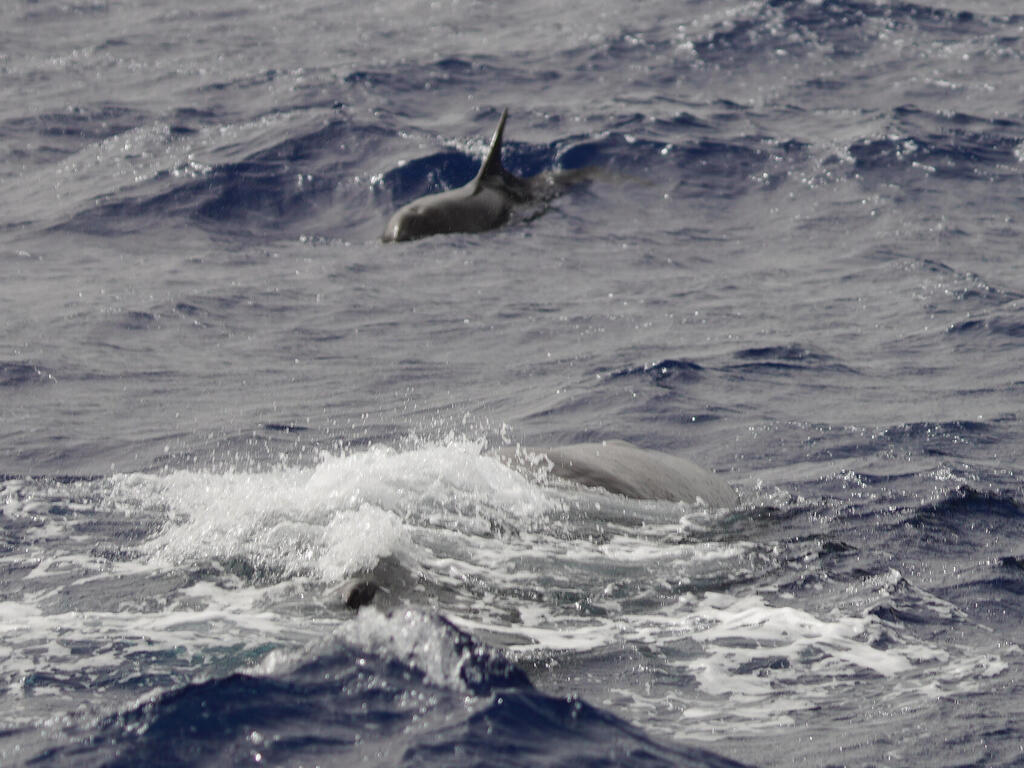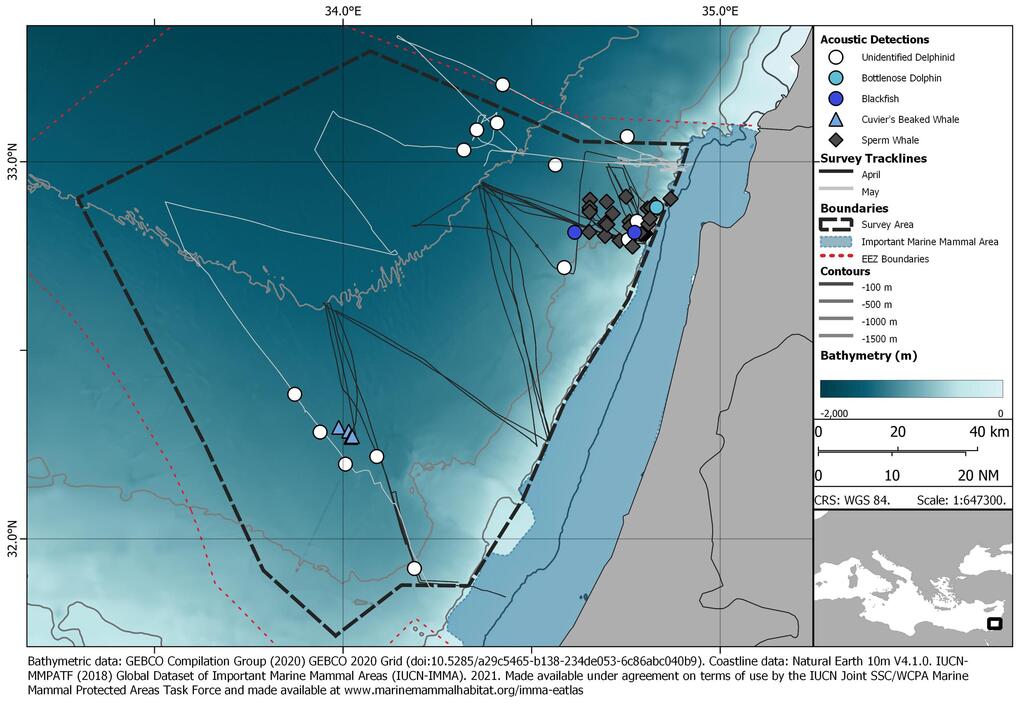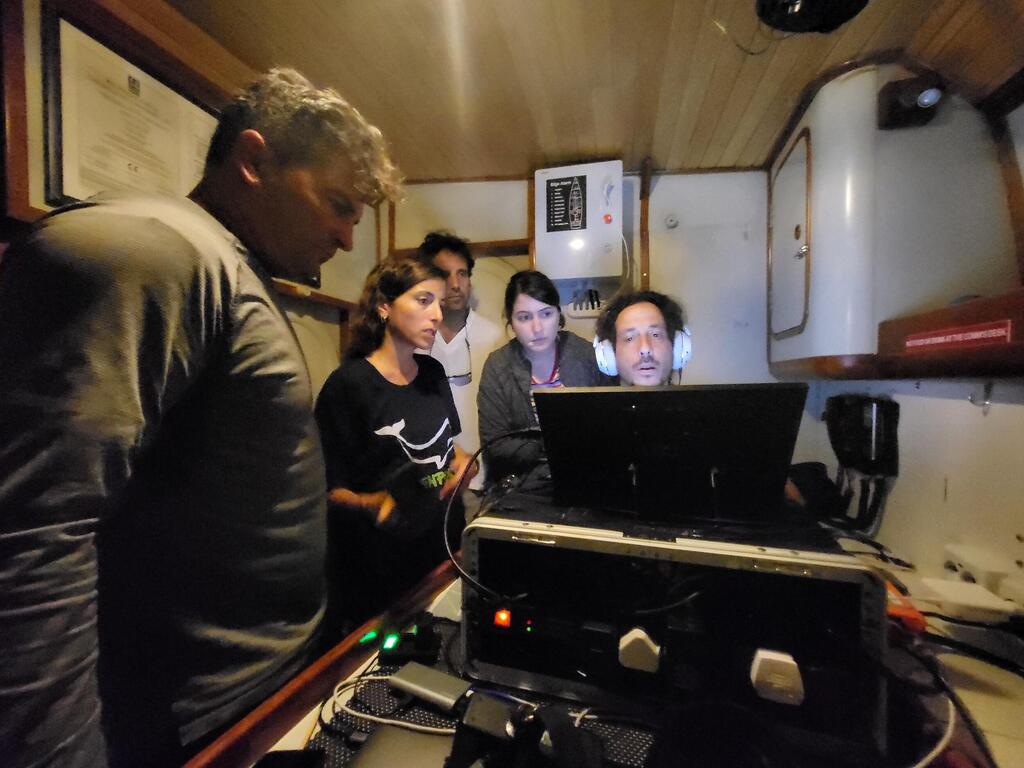According to a recent study conducted by Greenpeace's research unit at Exeter University, Haifa University, and research institutes in Italy, Israel's economic waters harbor species of endangered marine mammals, including two listed in the International Union for Conservation of Nature's (IUCN) red list.
The study, published in the peer-reviewed journal 'Aquatic Conservation', presents a comprehensive survey using both sound and visual methods to monitor marine mammals.
The survey took place last year during the months of April and May in the deep waters of Israel. The researchers recorded a pod of dolphins at a distance of approximately 9 miles from the shore of Haifa, at depths ranging from 1,213 feet to 5,640 feet.
One of the members in the group of dolphins was also captured on camera, making it the first "Blue and White" whale to be officially registered and cataloged based on its unique tail pattern, given the name Kim, after the student who documented it.
Subsequently, it was revealed that this particular young dolphin, initially documented in Israel, has been observed approximately 10 times in the past few years in the adjacent Ligurian Sea near Italy. As a result, its full name is now "Eliyah-Onda-Kim."
Overall, throughout the survey expedition, a hydrophone device was utilized to record a total of 22 acoustic events, including three encounters with the group of dolphins, an acoustic interaction with at least four individuals of the species known as beaked whales, an encounter with a dolphin, and also with seven unidentified dolphin-like creatures.
In the expansive depths of the Mediterranean Sea lie wide plains adorned with majestic underwater mountains, providing crucial havens for marine creatures. Among them, the Sperm whale and Cuvier's beaked whale, two magnificent species, face a distressing decline in their Mediterranean populations.
Classified as "endangered" and "vulnerable" by the IUCN, these whales are at risk of extinction. Recent findings reveal that within Israel's economic waters, extending up to 200 nautical miles from the coastline, a remarkable array of 12 whale species has sporadically graced the seascape.
As a result, according to the researchers, it is crucial to exercise utmost caution when making decisions regarding the exploration of new oil and gas reserves in the economic waters.
The two species are adversely affected by human-generated noise and are highly susceptible to significant harm in the event of a maritime spill. Consequently, careful deliberation is warranted before undertaking any activities that could potentially jeopardize their welfare.
In the past four and a half decades, about 50% of the marine population, comprising creatures like cetaceans, avians, and fish, has vanished across the globe. The Mediterranean Sea, a body of water facing significant challenges, bears the brunt of these pressures.
It is nearly enclosed, surrounded by densely populated coastlines impacted by human activities such as drilling, commercial ventures, excessive fishing, plastic pollution, and military operations. Moreover, the sea is not immune to the broader ramifications of climate change.
In addition to this study, researchers from the University of Haifa and Greenpeace have recently embarked on a new survey of the economic waters of the Mediterranean Sea.
Dr. Shaynin, Apex predator studies manager at Haifa University, noted that there is limited knowledge about whales and dolphins in the deep sea of Israel, adversely impacting the process of reaching well-informed decisions regarding their habitat.
The goal is to address this by conducting systematic acoustic and visual surveys. The initial survey, a groundbreaking collaboration between Greenpeace and the University of Haifa, has already produced fascinating results, which will be published in a scientific article.
Over the next three years, there are plans to conduct five more deep-sea surveys, supported by Greenpeace and subsequently funded by the Ministry of Energy, with the aim of bridging the knowledge gaps.
Dr. Jonathan Aikhenbaum, the director of Greenpeace Israel, emphasized the importance of preserving the deep sea of Israel, which is only just beginning to be explored. He raised concerns about the detrimental impact of new drilling activities in such a sensitive region, particularly during a critical climate emergency.
Apart from the harm inflicted on whales and marine life, these drilling operations would release significant amounts of potent greenhouse gases. Therefore, the Ministry of Energy is urged to prioritize the protection of the sea and the climate by canceling the proposed drilling operations.




